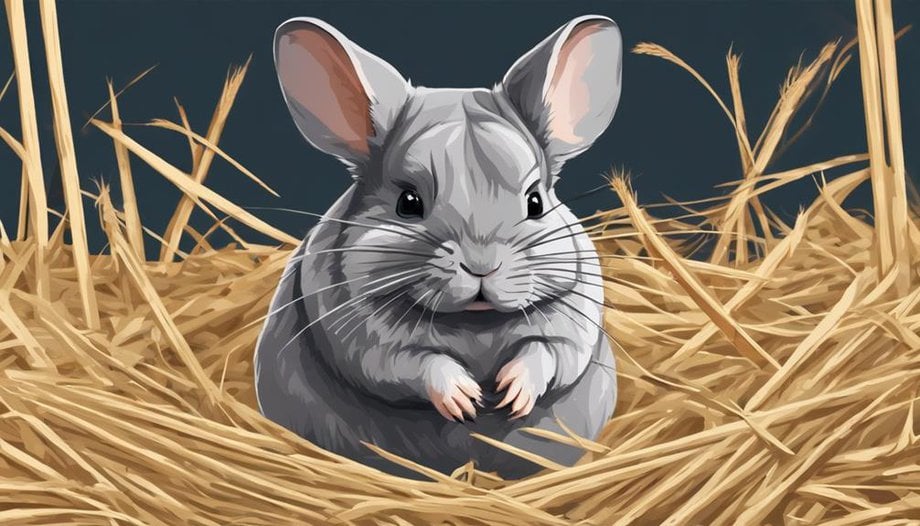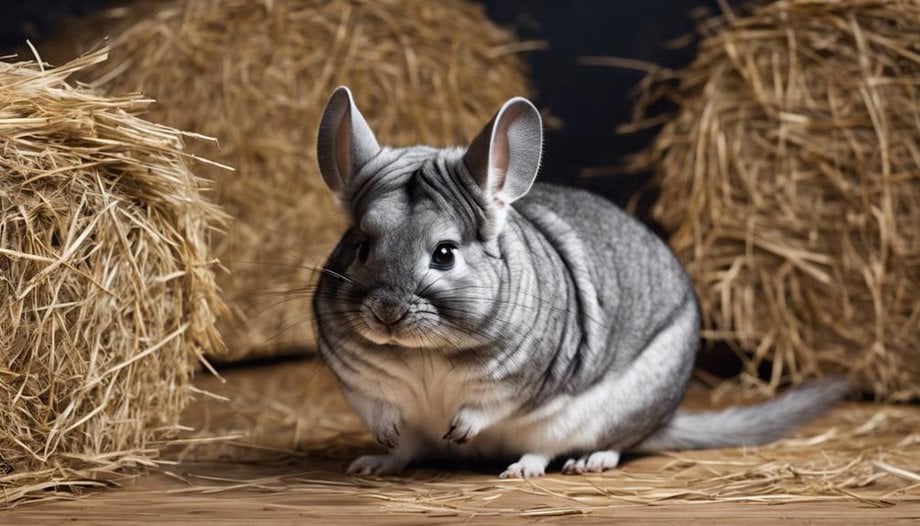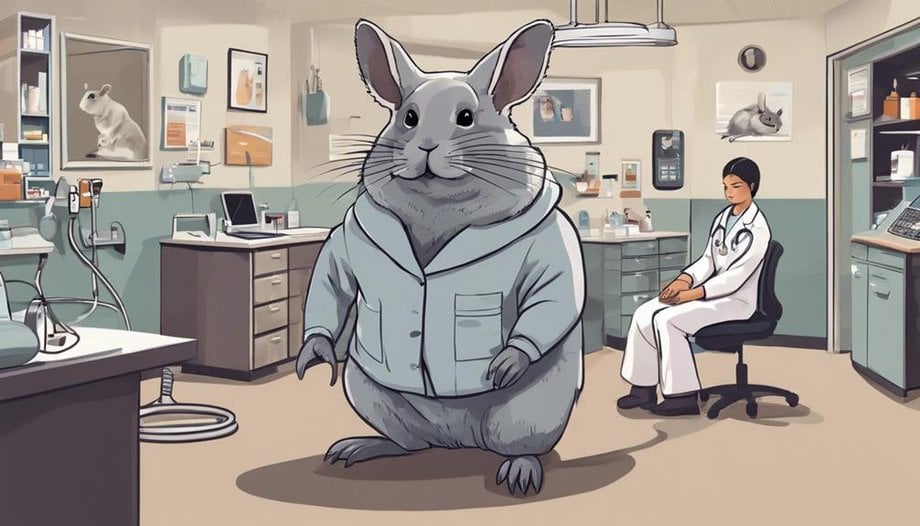What to Do for a Chinchilla Refusing to Eat Hay

Tips for getting a chinchilla to eat hay:
- Check for environmental changes.
- Try different hay varieties.
- Be patient and persistent in encouraging them to eat.
Potential Reasons for Hay Refusal
If your chinchilla is refusing to eat hay, it may be due to various factors such as dental issues or a change in diet preferences. Nutritional deficiencies and digestive issues might also play a role in your furry friend's reluctance to nibble on hay. These little creatures have delicate systems that can easily be disrupted by imbalances in their diet, leading to a loss of appetite for essential foods like hay.
Behavioral changes can also impact your chinchilla's hay-eating habits. Stress, anxiety, or even boredom can cause them to turn away from their usual diet. Dental problems, such as overgrown teeth or tooth pain, are common issues that can make chewing on hay uncomfortable for your pet.
It is important to monitor your chinchilla's behavior closely and seek veterinary advice if you notice persistent hay refusal. Ensuring a balanced diet, addressing any dental concerns, and creating a stress-free environment are essential steps in helping your chinchilla regain its appetite for hay.
Evaluate Chinchilla's Environment
Dear reader, as you ponder the hay untouched, consider the abode of your chinchilla. Is the cage a haven or a source of unease?
Check the hay's path – is it an easy trail to follow? Remember, the dance of temperature and humidity can sway appetite too.
Cage Setup Assessment
Evaluating your chinchilla's cage setup is crucial to guarantee a healthy and comfortable environment for your furry friend.
Make sure to take into account the following:
- Cage Enrichment: Provide a variety of toys and hiding spots to stimulate your chinchilla's mind and keep them active.
- Behavioral Changes: Monitor your chinchilla's behavior regularly to spot any signs of stress or discomfort, adjusting their environment accordingly.
- Nutritional Balance: Make certain your chinchilla's diet is well-balanced with the right mix of hay, pellets, and occasional treats to support their health and well-being.
Hay Accessibility Check
In ensuring your chinchilla's well-being, assess how easily they can access hay within their environment. Hay quality and dietary options are important factors in their diet. Check if the hay provided is fresh, free of dust, and mold. Guarantee hay storage is in a dry, well-ventilated area to maintain its quality.
Consider offering different types of hay to entice your chinchilla's appetite. Evaluate the feeding schedule to make sure a consistent supply of hay throughout the day. Make sure hay is easily reachable for your furry friend, placed in accessible hay feeders or scattered in their enclosure.
Temperature and Humidity
Assess the temperature and humidity levels in your chinchilla's environment to guarantee the best well-being and comfort for your furry companion.
- Humidity Management: Guarantee the humidity level in the chinchilla's habitat is between 40% to 60% to prevent respiratory issues.
- Temperature Control: Keep the temperature range between 60°F to 70°F to maintain your chinchilla's health and happiness.
- Comfort is Key: Creating a cozy and suitable environment for your chinchilla contributes to its overall well-being and encourages healthy eating habits.
Introduce Variety in Hay Types
To invigorate your chinchilla's appetite for hay, consider introducing a variety of hay types to their diet. Hay nutrition is essential for your little friend's health and happiness. Just like how we savor different flavors and textures, chinchillas may have preferences for specific hay types. By offering a selection, you cater to their whims and nurture their well-being.
| Nutrient-Rich Hay | Fiber-Packed Hay | Flavorful Hay | Texture-Rich Hay |
|---|---|---|---|
| Timothy Hay | Alfalfa Hay | Orchard Grass Hay | Meadow Hay |
| High in fiber and low in calcium | Rich in protein and calcium | Sweet and aromatic | Coarse and crunchy |
Imagine the joy in their eyes as they explore a buffet of hay options. Each type brings a unique blend of nutrients, flavors, and textures, enriching their diet and enticing their taste buds. Your chinchilla will thank you with every delighted nibble, embracing the diversity you provide with a heart brimming in contentment.
Monitor Chinchilla's Health

Keep a vigilant eye on your chinchilla's liveliness, for their health whispers secrets only the alert heart can hear. Your furry friend's well-being is paramount, and being attuned to subtle changes can make all the difference. Here are some key aspects to focus on:
- Weight Loss Monitoring: Regularly weigh your chinchilla to track any unexpected weight loss, as this could indicate underlying health issues.
- Nutritional Supplements: Consider adding nutritional supplements to your chinchilla's diet if they're experiencing a lack of appetite or aren't eating enough hay.
- Dental Health and Digestive Issues: Keep an eye on your chinchilla's dental health, as overgrown teeth can lead to digestive problems. Make sure they've access to proper chew toys to help maintain healthy teeth.
Try Hay Alternatives
Consider exploring alternative options to hay for your chinchilla's dietary needs. When hay isn't appealing to your furry friend, hay alternatives can provide essential nutrition options. Timothy hay pellets or cubes are excellent substitutes that maintain the necessary fiber content while offering a different texture that might entice your chinchilla's appetite. Additionally, orchard grass or botanical hays can be beneficial alternatives to traditional hay, providing variety and essential nutrients for your pet.
To stimulate your chinchilla's appetite, consider introducing small amounts of fresh herbs like cilantro or parsley. These treats can be enticing and help in encouraging your chinchilla to eat more of their hay alternatives. Another strategy is to mix in a small portion of high-fiber vegetables like bell peppers or carrots with the hay alternatives to create a varied and nutritious meal for your pet.
Experimenting with hay alternatives and incorporating appetite-stimulating feeding strategies can help assure your chinchilla receives the necessary nutrients while making mealtime an enjoyable experience.
Consult With a Vet

When your chinchilla refuses hay, consulting a vet is important. A vet's examination can reveal underlying health issues causing the refusal.
Don't delay as the implications of not eating hay can impact your chinchilla's well-being.
Vet Examination Importance
Ensuring a thorough vet examination for your chinchilla is paramount when they're refusing to eat hay. Your furry friend's well-being depends on it. A vet can provide insights and guidance tailored to your chinchilla's specific needs. Here's why consulting with a vet is essential:
- Early Detection: Vets can identify underlying health issues promptly.
- Professional Advice: Receive expert recommendations on diet and care.
- Tailored Treatment: Customized treatment plans for your chinchilla's recovery.
Health Implications of Refusal
Upon observing your chinchilla's refusal to eat hay, it becomes imperative to comprehend the potential health ramifications by consulting with a vet. Your furry friend's well-being is precious, and their reluctance to consume hay may indicate underlying issues that need attention.
Nutritional supplements could be necessary to make sure your chinchilla receives essential vitamins and minerals. Additionally, dental problems might be the culprit behind their aversion to hay, as overgrown teeth can cause discomfort while eating.
Your vet will conduct a thorough examination to pinpoint the root cause of the problem. Remember, addressing these health implications promptly is important to safeguarding your chinchilla's health and happiness. Trust the expertise of your vet to provide the best care for your beloved pet.
Be Patient and Persistent
In the journey to encourage your chinchilla to eat hay, remember that patience and persistence are the keys to success. Your chinchilla may take time to adjust to new hay preferences or overcome behavioral changes that affect its eating habits.
Here are some gentle reminders to guide you through this process:
- Gentle Encouragement: Be kind and understanding, offering your chinchilla reassurance and support as it navigates this adjustment period.
- Consistent Routine: Establish a consistent feeding schedule and environment to help your chinchilla feel safe and secure while exploring the hay.
- Celebrate Small Wins: Acknowledge and celebrate even the smallest progress your chinchilla makes towards eating more hay, as every step is a step in the right direction.
Frequently Asked Questions
Can Chinchillas Eat Any Type of Hay, or Are There Specific Types That Are Better for Them?
In the world of hay for chinchillas, variety is the spice of life. Different types offer unique nutritional benefits. Maintain a clean hay feeder to keep your furry friend healthy and happy.
How Often Should I Be Cleaning My Chinchilla's Hay Rack or Hay Feeder?
To maintain a healthy environment for your chinchilla, it's important to clean the hay rack regularly. Frequent cleaning prevents bacterial growth, ensuring your pet has fresh hay. Aim to clean the hay feeder at least every few days for best hygiene.
Are There Any Specific Vitamins or Supplements I Should Add to My Chinchilla's Diet if They Are Refusing Hay?
In the domain of chinchilla care, when hay is avoided, seek hay alternatives like high-fiber pellets or botanical hay. Nutrition supplements can aid in health concerns, but consult a vet first. Embrace varied feeding strategies.
Can a Chinchilla's Hay Preference Change Over Time, or Should I Stick to One Type of Hay Consistently?
In the world of chinchillas, hay variety can be enticing. Taste preferences may shift like the winds, embrace change. But in consistency lies peace. Dietary changes with caution, for harmony is found in balance.
Are There Any Specific Behaviors or Signs I Should Look Out for to Indicate That My Chinchilla Is Still Getting Enough Nutrients Despite Refusing Hay?
To make sure your chinchilla remains healthy despite hay refusal, observe for weight loss, changes in activity, or fur quality. Nutritional alternatives like pellets or seeking veterinary advice can help. Monitor behavior closely and consider hay substitutes.











